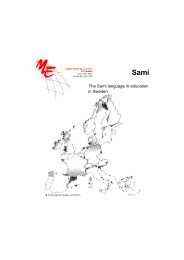Multilingual Early Language Transmission (MELT) - Mercator ...
Multilingual Early Language Transmission (MELT) - Mercator ...
Multilingual Early Language Transmission (MELT) - Mercator ...
You also want an ePaper? Increase the reach of your titles
YUMPU automatically turns print PDFs into web optimized ePapers that Google loves.
languages they are learning. Also, both within BFLA and within ESLA there is usually uneven<br />
development, which means that bilingual children's languages are not used and known at<br />
the very same level. Even Yann, who speaks both Breton and French fluently and without<br />
noticeable influence from one language on the other, speaks about school subjects more<br />
easily in French, but when he's talking about his little herb garden he can discuss it much<br />
better in Breton. Again, such differences have to do with input conditions: Yann goes to<br />
school in French, and his father dug out and planted the herb garden with Yann while<br />
speaking Breton.<br />
The importance of communicative need<br />
Yann's father does not only speak Breton to Yann, but also French. When father and son<br />
discuss the position of the stars or how a car works, it's in French. Talking about the herb<br />
garden and relatives and friends takes place in Breton. From the beginning, there has been a<br />
sort of topic specialization in the family. Certain topics are discussed in Breton, others in<br />
French. It was just seen as natural that as he started to speak, Yann would respond in the<br />
same language that he was spoken to. If as a toddler Yann spoke Breton when his parents<br />
were talking French, they would sometimes genuinely not understand and would ask Yann<br />
what he meant. Or when Yann clearly didn't know the required word in the right language,<br />
they would tell him what it was and then expect him to use it. In other words, from the<br />
beginning Yann's parents were alert to the language Yann was speaking, and were insisting<br />
that he speaks the language they were speaking. They were thus creating a communicative<br />
need for Yann to speak both languages. Since Yann was two years old, he has been<br />
responding in the language spoken to.<br />
This has been different for Pelle. His mother tends to speak Frisian to Pelle mainly when his<br />
father is not present. This is a fairly clear communicative situation, and within it, Pelle's<br />
mother could have insisted that Pelle respond in Frisian. He did respond in Frisian a little at<br />
the beginning, but this soon stopped and his mother was never particularly focused on<br />
which language Pelle was responding in. If he responded in Dutch she just continued the<br />
conversation in Frisian. As such, there was no real communicative need for Pelle to speak<br />
Frisian. This, combined with the fact that Pelle heard Frisian far less frequently than Dutch,<br />
lead him to restrict himself to Dutch so that he is not speaking the minority language.<br />
In Bronwyn's bilingual preschool there are teachers who use only Welsh as a medium of<br />
instruction and others who use only English. When the English-speaking teacher interacts<br />
with the children, either she does not respond to Welsh or she asks children to say what<br />
they mean in English. Some second-language children like Bronwyn often lack the necessary<br />
vocabulary in English, so teachers provide the missing English word, and then ask children to<br />
repeat what they wanted to say in English. Children at this school soon learn to try to speak<br />
only English to the English-speaking teacher, and Welsh only to the Welsh-speaking teacher.<br />
At the bilingual school, then, just like in Yann's bilingual family, there are little "unilingual"<br />
islands, that is, interactional settings that require the use of just a single language for<br />
everybody involved.<br />
Such unilingual interactional settings in each language require children to actually speak two<br />
languages. This offers them the advantage of practicing. If you want to learn to play the<br />
97



